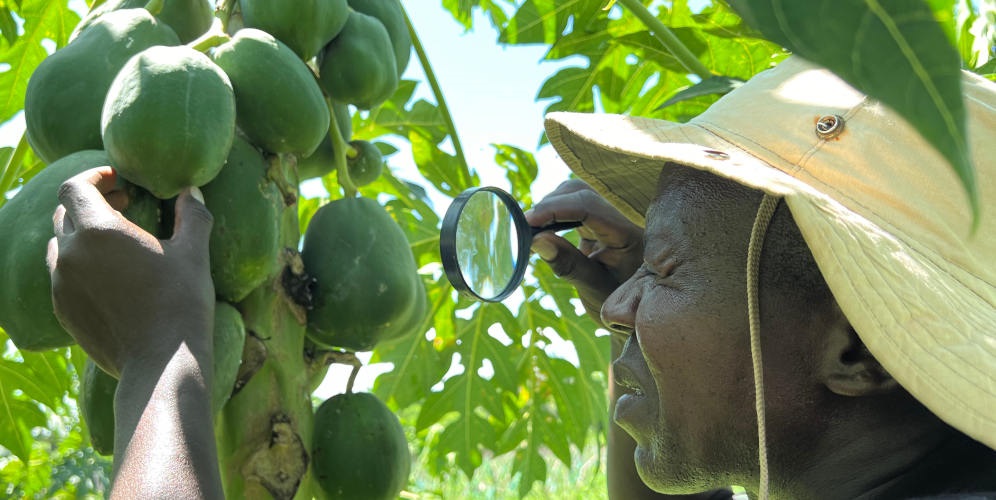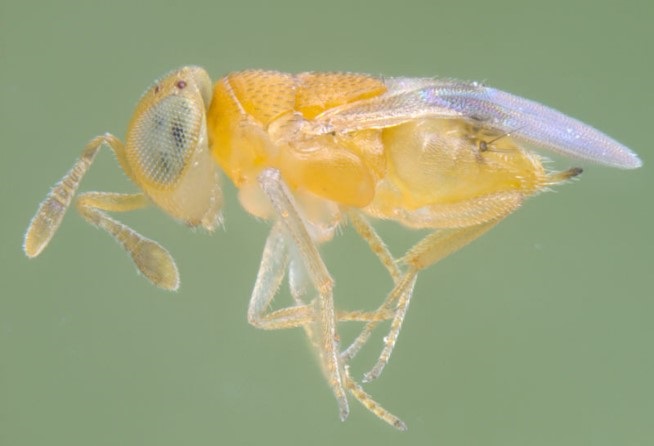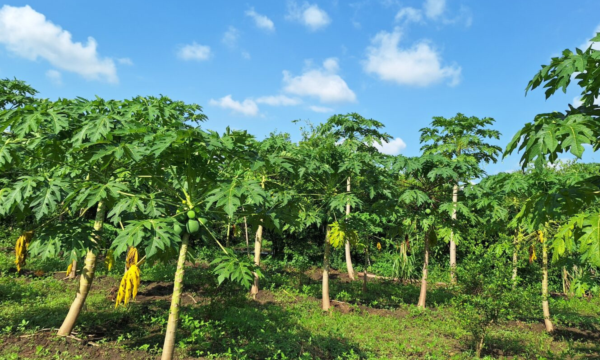
CABI-led study has found a positive change in farmers’ perceptions of biological control. Findings suggest farmers’ knowledge has been enhanced by their inclusion in the early stages of a biological control initiative.
The research, published in the journal African Entomology, considered changes in farmers’ knowledge, attitudes and practices towards biological control of papaya mealybug (Paracoccus marginatus) following initial releases of the parasitic wasp Acerophagus papayae in the coastal counties of Kilifi, Kwale and Mombasa in Kenya.
Interviews were conducted with farmers across two years (i) in 2021, prior to release of A. papayae and (ii) in 2022, following initial releases of A. papayae. A comparison is made between 141 farmer responses across survey years complemented by information from three focus group discussions.
Increase in awareness of biological control across survey years
The results highlighted a 12% increase in awareness of biological control across survey years and a positive change in perception of biological control attributes such as effectiveness and improved crop productivity.
Furthermore, a difference-in-difference analysis showed that on average treatment farms achieved approximately 196kg greater production than the control farms and the control farms lost a greater amount of income (USD $94) than the treatment farms across the survey years.
Kate Constantine, a lead author of the study and Project Scientist at CABI, said, “The findings from this study highlight the need for continued awareness raising and gender responsive farmer education on the use and benefits of biological control, and how to reduce the use of chemical pesticides.”
Papaya mealybug invaded East Africa between 2015 to 2020. The pest causes 57-91% yield and £2,224/ha household economic losses annually and severely impacts the livelihoods of smallholder farmers.
As a means of control, nearly 51% of farmers manage the pest using chemical pesticides which harm insect biodiversity in addition to other non-target effects. Biological control is an ecologically friendlier approach that has demonstrated effective control of papaya mealybug elsewhere around the globe.
Farmer perceptions of attributes of biological controls increased over time
The latest study highlights the need to engage farming communities in biological control initiatives to increase understanding and support the success of biological control efforts.
Overall, farmer perceptions of attributes of biological controls increased over the survey years. For example, there was a 17% increase in the perception of biological control as effective in controlling pests, a 10% increase in perception that using biological control increases crop productivity, an 8% increase in perception of biological control as affordable.
There was a small decrease in the perception that biological control is slow to work and labour intensive. However, there were differences between women and men’s perceptions of biological control attributes. In most instances men demonstrated more positive perceptions.

For example, 14% more men than women perceived biological control to increase crop productivity, and 12% more perceived use of biological control to promote plant growth. This difference became even more marked in the follow-up study where men were 18-21% more likely to perceive biocontrol as effective, safe and affordable than women.
Women’s positive perceptions did increase over time. For example, 29% of women perceived biological control as effective in 2021 which increased to 37% in the follow-up study. Men’s perceptions of effectiveness increased from 35% to 55%. Women in the follow up study report biological control to be more labour intensive than men.
Value of biological control and the importance of engaging with farmers
Ms Constantine added, “Through the continued engagement with farmers affected by papaya mealybug their biological control knowledge and capacity will be strengthened. As such, biological control of papaya mealybug using A. papayae could provide a much-anticipated example of the value of biological control and the importance of engaging with farmers.
“Thereby addressing one of the key challenges to the success of biological control in sub-Saharan Africa.The findings from this study also highlight the need for attention to gender responsive approaches towards farmer education and engagement.”
Since this research was conducted the Kenya Standing Technical Committee on Imports and Exports (KSTCIE) approved the widespread use of A. papayae against papaya mealybug in all of Kenya’s papaya growing counties.
CABI scientists and colleagues from the Kenya Agricultural and Livestock Research Organisation (KALRO), the Kenya Plant Health Inspectorate Service (KEPHIS) and the National Museums of Kenya (NMK) worked hard to assess the effectiveness of A. papayae as part of Integrated Pest Management (IPM) plans.
The tiny wasp that parasitizes the papaya mealybug and lowers its numbers naturally has been found to be effective in controlling papaya mealybug populations in other countries such as Ghana, Guam, Palau, Sri Lanka, Pakistan, Puerto Rico, and the Dominican Republic.
Additional information
Main image: Study finds positive change in farmers’ perception of biocontrol following engagement in early stages of biological control initiative (Credit: CABI).
Full paper reference
Constantine K, Makale F, Mugambi I, Chacha D, Ogunmodede A, Opisa S, et al. Understanding changes in farmers’ knowledge, attitudes, and practices after releasing Acerophagus papayae (Hymenoptera: Encyrtidae), a biocontrol agent for papaya mealybug (Paracoccus marginatus) (Hemiptera: Pseudococcidae) in Kenya. Afr. Entomol. [Internet]. 2025 Oct. 29 [cited 2025 Oct. 29];33(1). Available from: https://www.africanentomology.com/article/view/20042
Related News & Blogs
CABI-led study shows potential distribution of natural enemy for papaya mealybug pest across Africa
A new CABI-led study has shown the potential distribution of a natural enemy that is being used to fight the devastating papaya mealybug pest across East Africa. The scientists, who published their findings in the journal Biological Control, used a pre…
12 December 2024



